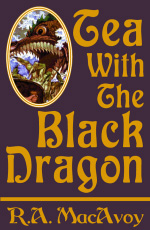When I first read Tea With the Black Dragon I had never tasted Oolong tea. Now I have a special pot for it.
Tea With the Black Dragon is an odd but charming book. It’s the kind of book that when someone mentions it, you smile. It’s unusual in a number of ways. It’s set at a very precise moment of the early eighties, which can be deduced from the very specific technology—but it’s a fantasy. It has an action-adventure plot with kidnapping, embezzlement and early eighties computer fraud—but that’s secondary to what it’s about. (If ever a book had plot to stop everything happening at once, this would be it.) One of the major characters is a fifty year old divorced single mother who may be a boddhisvata. Another is a Chinese dragon. The whole book is infused with Chinese mythology and CPM era computers. It’s very short, barely a couple of hours’ read, which was unusual even when books used to be shorter.
This was MacAvoy’s first novel, and it received a lot of attention. She won the Campbell Award for best new writer in 1984. The book won a Locus Award for best first novel, and was nominated for the World Fantasy Award (losing to The Dragon Waiting). It was also nominated for the Hugo and Nebula (losing in both cases to Startide Rising). It had a special citation for the Philip K. Dick Award, essentially coming second to The Anubis Gates. So a great many people liked this book and I expect they’re all smiling to think of it. I think a great deal of the popularity and acclaim came from how lovely it is, and the rest of it came from how amazingly unusual it was in 1983 to have a fantasy novel using Chinese mythology and with a Chinese protagonist. We were parched for it and delighted with it when we got it. I can remember being excited by what seems to me today to be charming, but quite slight. We’ve come a long way.
MacAvoy is a hit and miss writer for me—when I love her books I really love them, and when I don’t I get bored. I think I’ve read at least the first volume of everything she’s written. She’s notable for using unusual cultures and mythologies, and also for doing her homework. The direct sequel to Tea With the Black Dragon, Twisting the Rope, is one of the ones I don’t care for.
My next-door neighbour, who posts here as Cybernetic Nomad, pointed out a very interesting thing about this book. Science fiction went straight from Multivac to Cyberpunk, without really pausing at the stage of breadboards and CP/M hand-written word processors. Fantasy however did, we have in Tea With the Black Dragon a precise snapshot of an era of computing history. (I could also add Hambly’s The Silent Tower to this, with the evil wizard’s brain coded in CP/M on computers that ran on despair, an idea later fully implemented by Microsoft as Windows 95.)
As in 1983 I was struck by the fascinating use of Chinese mythology, it’s worth mentioning that on this read I was a little surprised that everyone apart from Mr. Long was white—surely there were Asian geeks in California in the eighties? The Stanford students are described as all bicycling, but also all blond. Very odd.
The central questions of the book are “what does it mean to be human” and “what is truth”—not small thing to tackle in a first novel, and MacAvoy deals with them well, and in a manner that suits the central Zen theme. What it means to a dragon to be human is a question people don’t ask often enough.
Jo Walton is a science fiction and fantasy writer. She’s published eight novels, most recently Half a Crown and Lifelode, and two poetry collections. She reads a lot, and blogs about it here regularly. She comes from Wales but lives in Montreal where the food and books are more varied.










